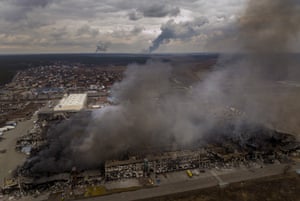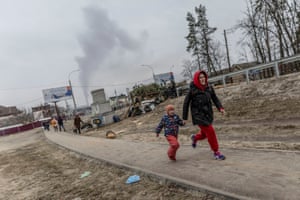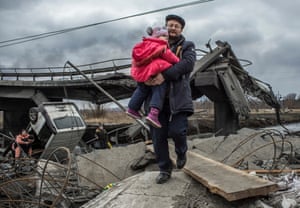Russia-Ukraine war: Zelenskiy vows to ‘punish atrocities’ as family dies trying to evacuate Irpin – live | World news
20:44
20:31
20:21
When Russian state TV announced the invasion of Ukraine last week, it did not use the words “attack”, “invasion” or “war”. Instead it reported on a “special military operation” in the neighbouring country designed to liberate a nation that would welcome Russia’s forces to free it from fascism.
The Guardian’s Moscow correspondent, Andrew Roth, provides an insight as to what Russians are being told about the war in Ukraine. He tells Michael Safi that this initial distortion of the facts did not last the week. Instead, as the war grew more intensive and Russian forces met with fierce resistance, there was a subtle change in what Russians were told was going on. Yes, casualties were being taken, major cities were being targeted, but it was a necessary sanction against a government propped up by an imperialist west, determined to humiliate Russia.
Now, as the attacks get increasingly deadly and cities are transformed by bombing campaigns, Russian propagandists are having to adapt their message again. Meanwhile, an economic crunch unlike any other most Russians have faced before is hitting them in their wallets, and many are looking for who’s to blame. As Andrew Roth explains, it’s not necessarily their own government led by Vladimir Putin.
Updated
20:17
20:12
‘We will find every bastard’, Zelenskiy warns
Updated
19:35
19:16
19:01
Updated
18:46
Ukraine and Russia to face off at World Court over genocide claim
18:44
Updated
18:22
The full story on Boris Johnson’s pledge to send more defensive equipment and aid to Ukraine:
Boris Johnson has pledged to send more defensive equipment and $100m to Ukraine to hold off Russian troops and mitigate financial pressures facing the country, but was accused of moving too slowly and timidly to clamp down on oligarchs’ dirty money in the UK.
Emergency legislation is due to be rushed through the House of Commons on Monday, intended to create a register of overseas ownership of UK land and property, reform unexplained wealth orders and make it easier to prosecute those involved in breaking sanctions.
The economic crime bill will be supported by opposition parties, but ministers were warned it would still give those suspected of money laundering a “get out of London free card” and contained loopholes that could let people disguise or liquidate their assets before the new powers come into effect.
Keir Starmer, the Labour leader, said he was frustrated ministers were “going slowly” and that there were “echoes of Afghanistan”, claiming the government “really only begins to get its act together and respond in the heat of the situation rather than preparing for it beforehand”.
Dominic Raab, the deputy prime minister, said on Sunday it could take months or even years for the Russian president, Vladimir Putin, to be defeated in his ambition to conquer Ukraine.




